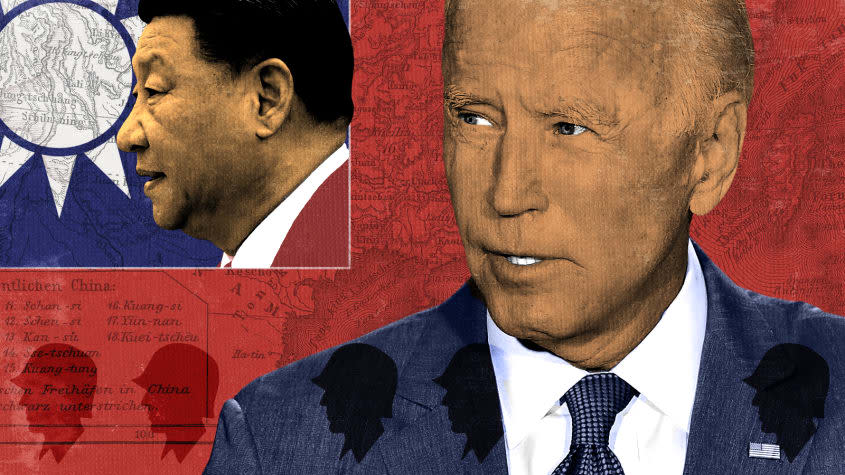Would the U.S. really defend Taiwan from a Chinese invasion?

President Biden has created controversy on his trip to Asia. On Sunday, he told a news conference that he would be willing to use force to defend Taiwan from an attack by China.
"That's the commitment we made," Biden told reporters. Taiwan's foreign ministry thanked Biden for his public comments, while Beijing responded angrily: "No one should underestimate the strong determination, firm will, and strong ability of the Chinese people to defend national sovereignty and territorial integrity, and do not stand against the 1.4 billion Chinese people." Why did Biden's remarks create such a fuss?
What's the relationship between China and Taiwan?
The two are governed as separate countries, under different regimes, but China considers Taiwan a renegade province: Chang Kai-shek and his army fled to the island after Mao Zedong and the Communist Party won control of mainland China in 1949. The two have been at odds ever since. "Taiwan has been governed independently of China since 1949, but Beijing views the island as part of its territory," Lindsay Maizland writes for the Council on Foreign Relations. "Beijing has vowed to eventually 'unify' Taiwan with the mainland, using force if necessary."
There has occasionally been talk of peaceful reunification, particularly during the 1980s. "China put forward a formula, known as 'one country, two systems', under which Taiwan would be given significant autonomy if it accepted Chinese reunification," the BBC says in its explainer. But after Taiwan elected a president who talked about "independence" for the island, China in 2004 "passed a so-called anti-secession law, stating China's right to use 'non-peaceful means' against Taiwan if it tried to 'secede' from China." The relationship between the two remains troubled.
Does that mean an invasion is likely?
An invasion of Taiwan "has been considered by Chinese military planners for decades," says Alex Gatopoulos at Al Jazeera, "but only under President Xi Jinping have observers worried this might be increasingly likely." In recent months "aggressive patrolling and overflights of Taiwanese airspace by aircraft from the Chinese air force have added a sense of urgency that this could very well happen in the near future."
American officials don't expect that to happen soon, however. National Intelligence Director Avril Haines recently told a Senate committee that "China isn't yet prepared to successfully invade Taiwan and probably won't try it soon in the belief that the U.S. is 'distracted' by the Ukraine war," John A. Tirpak writes for Air Force Magazine. Instead U.S. officials believe 2027 "is the point at which the U.S. thinks China believes it could prevail" in an invasion.
What does the U.S. have to do with all of this?
Officially, we don't know. The United States has pursued a policy of "strategic ambiguity" on Taiwan — trying not to tip its hand on whether or not it would help defend the island from a Chinese invasion. American law "states that the United States will maintain the capacity to defend Taiwan but does not state whether or not the United States would actually militarily intervene," David Gitter says at The Diplomat. The idea is to preserve the status quo without starting a war: Being vague allows the U.S. "to protect its normalized relations with China … while still threatening to quash a Chinese cross-strait attack" and it also helps "prevent Taiwan's more independence-leaning leaders from assuming they had a blank check from Washington to declare de jure independence."
That's why Biden's statement over the weekend was such a big deal: It wasn't vague at all and "was one of the most forceful presidential statements in support of self-governing [by Taiwan] in decades," Josh Boak, Aamer Madhani and Zeke Miller report for The Associated Press. But the White House insisted that "Biden's comments did not reflect a policy shift" and indeed we've seen this story before: "It's not the first time Biden has pledged to defend Taiwan against a Chinese attack, only for administration officials to later claim there had been no change to American policy."
Is 'strategic ambiguity' really all that ambiguous?
Probably not. The U.S. appears to be preparing for a fight: "Under Presidents Joseph Biden and Donald Trump, the United States has begun to support Taiwan more overtly," Christopher Booth writes for the U.S. Naval Institute. Just last month, the U.S. approved the sale of a $95 million missile defense system to Taiwan, and officials last year acknowledged that Marines and special forces units were in Taiwan to help train military forces there.
Accordingly, some experts think the U.S. should drop the policy in favor of a more explicit defense guarantee for Taiwan. Strategic ambiguity "is unlikely to deter an increasingly assertive, risk-tolerant, and capable China," Richard Haass and David Sacks wrote last year for Foreign Affairs. "The best way to reduce the risk of war would be to make explicit to China that the United States would respond to an attack against Taiwan with all of the tools at its disposal, including severe economic sanctions and military force." But others — like Steven Goldstein, writing at the National Bureau of Asian Research — argue for staying the course. "Such a change would not serve the two essential national interests of the United States in the area—sustaining a peaceful status quo and maintaining working relationships with both China and Taiwan."
You may also like
John Oliver has some complaints about Subway, America's largest restaurant chain

 Yahoo Movies
Yahoo Movies 
